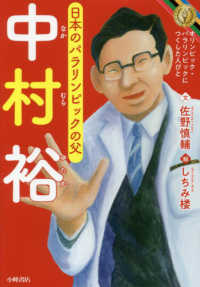- ホーム
- > 洋書
- > 英文書
- > Cinema / Film
Full Description
Using theories of national, transnational and world cinema, and genre theories and psychoanalysis as the basis of its argument, Japanese Horror Cinema and Deleuze argues that these understandings of Japanese horror films can be extended in new ways through the philosophy of Deleuze.
In particular, the complexities and nuances of how films like Ju-On: The Grudge (2002), Audition (1999) and Kairo (2001) (and beyond) form dynamic, transformative global networks between industries, directors and audiences can be considered. Furthermore, understandings of how key horror tropes and motifs apply to these films (and others more broadly), such as the idea of the "monstrous-feminine", can be transformed, allowing these models to become more flexible.
Contents
List of figures
Acknowledgements
Preface
Introduction
Part One: Theory
1. Theoretical Intersections: The Japanese Horror Genre and National, Transnational and Global Flows
2. Theoretical Transformations: The Perspectives of Gilles Deleuze
Part Two: Case-Studies
3. The "Any-Space-Whatever", "Becoming-Woman" and Ju-On: The Grudge (2002)
4. Auteurship, Adaptation and the Molecularity of Audition (1999)
5. Kairo (2001): Cosmicism and "Becoming-Machine"
Conclusion
Bibliography
Index








